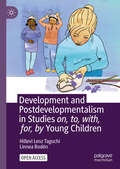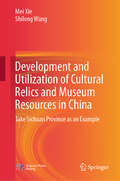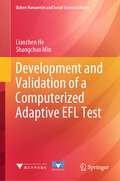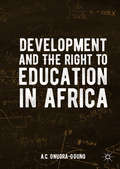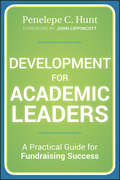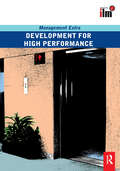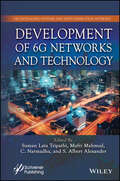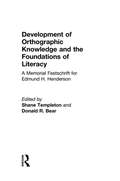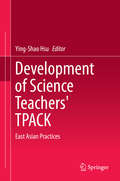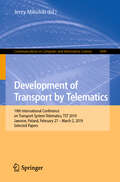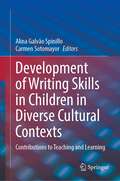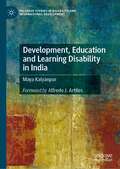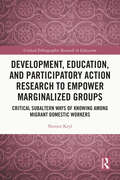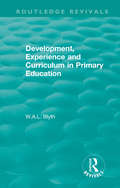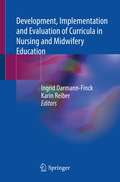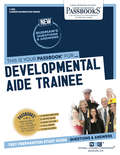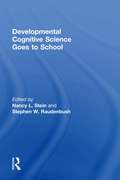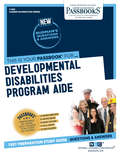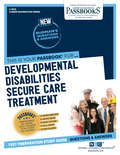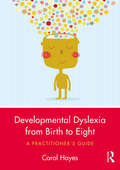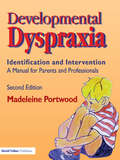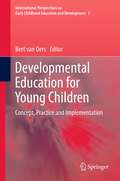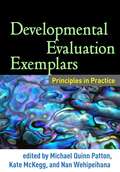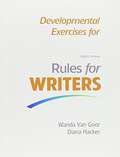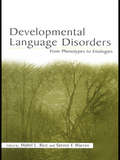- Table View
- List View
Development and Postdevelopmentalism in Studies on, to, with, for, by Young Children
by Hillevi Lenz Taguchi Linnea BodénThis open access book directs its attention to a desire for inter- and transdisciplinary, reciprocal collaborations in studies concerning young children. It focuses on the possibilities and obstacles in collaborative forms of inquiry involving those stakeholders and actors whom the research concerns, specifically the participating children. The backdrop of the discussions and theoretical investigations is the inter- and transdisciplinary project Enhancing Children’s Attention. Within the framework of an evidence-based intervention, this project performed multiple qualitative forms of inquiry, including emergent forms of collaborations with children. The book provides a discussion on how young children’s development, learning, and lives are understood in the developmental sciences, and in the humanities and social sciences. It specifically addresses scholars interested in postdevelopmental, posthumanist, new materialist, and postqualitative approaches. The book proposes a displaced form of postdevelompentalism for future collaborative forms of inquiry with a focus on multiple forms of knowledge and knowing.
Development and Utilization of Cultural Relics and Museum Resources in China: Take Sichuan Province as an Example
by Shilong Wang Mei XieThis book offers fresh critical insights to the field of cultural and museum resources, aiming to explore its transformation and utilization from the cultural value theory. This book for the first time examines the current situation of cultural and museum resources in Sichuan province and proposes that museum cultural creative industries are a new development trend. The content is divided into four sections but interrelated sections to highlight the importance and rationalities of the utilization of cultural and museum resources in Sichuan province. It begins with an exploration of the current situation of cultural and museum resources. This is followed by a section that illustrates the existing issues in the process of its utilization. Lastly, it reveals the influencing factors, experiences, and value of utilization of cultural and museum resources. This book is extremely useful to readers in museums, cultural heritage, and cultural policies studies, cultural industries not just it offers substantive content on museum knowledge, but also because it offers conceptual tools for studying Chinese museum cultural creative industries from a different perspective and re-discusses the relationship between utilization (commercial value) and protection (archaeological value) of museums, and provides some suggestions for policymakers and museum managers.
Development and Validation of a Computerized Adaptive EFL Test (Qizhen Humanities and Social Sciences Library)
by Lianzhen He Shangchao MinThe book reports on the development and validation of a computerized adaptive EFL test, which is used as an exit requirement for non-English-major undergraduates at a major Chinese university. Unlike the tests reported in previous research on computerized adaptive language test (CALT), which were mostly designed to assess vocabulary, grammar and reading, this test consists of listening and reading components using both dichotomously-scored stand-alone items and polytomously-scored testlet-based items. The book is an essential and stimulating read for researchers and graduate students in the testing domain, particularly for those who are interested in CALT, item response theory (IRT), and quantitative research methods in general. It also constitutes a solid reference resource for L2 teachers and test developers. One of the distinctive features of the book is its operationalization of assessment use argument (AUA) in the investigation of the construct validity of the CALT. Another strength of this book is that it provides insight into the specific procedures that are followed in the development of CALTs and addresses a few key issues, such as local item dependence and DIF detection that were ignored in previous CALT development research.
Development and the Right to Education in Africa
by A.C. Onuora-OgunoThis book is about the right to basic education and its impact on development in Africa. It focuses on the elusive subject of litigating the right to education by examining jurisprudence from select African countries and India. The project further analyses the various challenges that impede access to education, with the attendant lack of political will to curb corruption, and calls for the building of strong institutions and the involvement of both state and non-state actors in driving development via education. It also covers the scope for legal practitioners and policy makers, and supports institutional framework in realizing the right to basic education.
Development for Academic Leaders
by Penelepe C. HuntFundraising is an increasingly important responsibility for academic leaders, from department chairs to deans and on up into the executive ranks in higher education. In this concise, practical guide, Penelepe Hunt (professional fundraiser, teacher, management consultant, and executive coach) shows the vital role that academic leaders play in raising funds. She explains how leaders can learn the skills to become effective at networking, entrepreneurial, and productive fundraisers. Hunt also breaks down fundraising in a way that clarifies roles, responsibilities, programs, activities, politics, sources, and process--everything an academic leader needs to know in order to succeed in development activities.
Development for High Performance Revised Edition: Revised Edition (Management Extra Ser.)
by ElearnManagement Extra brings all the best management thinking together in one package. The series fuses key ideas with applied activities to help managers examine and improve how they work in practice. Management Extra is an exciting, new approach to management development. The books provide the basis for self-paced learning at level 4/5. The flexible learning structure allows busy participants to study at their own convenience, minimising time away from the job. The programme allows trainers to quickly plan and deliver high quality, business-led courses. Trainers can select materials to meet the needs of their delegates, clients, and budget. Each book is divided into themes of ideal length for delivering in a training session. Each theme has a range of activities for delegates to complete, putting the training into context and relating it to their own situation and business. The books’ lively style will stimulate further interest in the subjects covered. Guides for further reading and valuable web references provide a lead-in to further research. Management Extra is based on the NVQ framework to ease the creation of Diploma, Post Graduate Diploma or NVQ programmes for managers. It is accredited with all leading awarding bodies.
Development of 6G Networks and Technology (Next Generation Computing and Communication Engineering)
by Suman Lata Tripathi Mufti Mahmud S. Albert Alexander C. NarmadhaThis book provides an in-depth exploration of the potential impact of 6G networks on various industries, including healthcare, agriculture, transport, and national security, making it an essential resource for researchers, scholars, and students working in the field of wireless networks and high-speed data processing systems. Development of 6G Networks and Technology explores the benefits and challenges of 5G and beyond that play a key role in the development of the next generation of internet. 6G is targeted to improve download speeds, eliminate latency, reduce congestion on mobile networks, and support advancements in technology. 6G has the potential to transform how the human, physical, and digital worlds interact with each other and the capability to support advancements in technology, such as virtual reality (VR), augmented reality (AR), the metaverse, and artificial intelligence (AI). Machine learning and deep learning modules are also an integral part of almost all automated systems where signal processing is performed at different levels. Signal processing in the form text, image, or video needs large data computational operations at the desired data rate and accuracy. Large data requires more use of IC area with embedded bulk memories that lead to power consumption. Trade-offs between power consumption, delay, and IC area are always a concern of designers and researchers. Energy-efficient, high-speed data processing is required in major areas like biomedicine and healthcare, agriculture, transport, climate change, and national security and defense. This book will provide a foundation and initial inputs for researchers, scholars, and students working in the areas of wireless networks and high-speed data processing systems. It also provides techniques, tools, and methodologies to develop next-generation internet and 6G.
Development of Orthographic Knowledge and the Foundations of Literacy: A Memorial Festschrift for edmund H. Henderson
by Shane Templeton Donald R. BearThis volume unites spelling and word recognition -- two areas that have largely remained theoretically and empirically distinct. Despite considerable advances in the investigation of processes underlying word perception and the acknowledgement of the seminal importance of lexical access in the reading and writing processes, to date the development and functioning of orthographic knowledge across both encoding and decoding contexts has rarely been explored. The book begins to fill this void by offering a coherent and unified articulation of the perceptual, linguistic, and cognitive features that characterize an individual's advancing word/orthographic knowledge, providing evidence for a common knowledge base underlying spelling in writing and word recognition in reading. From a developmental perspective, the studies and syntheses presented in this volume blend insights from psychology and language study with those from clinical and classroom observations. These insights help explain how individuals, from preschool through adolescence, develop knowledge of the orthographic system underlying word structure in English and how they apply this knowledge in actual writing and reading contexts. Implications are drawn for the assessment and teaching of spelling, vocabulary, and word analysis from primary through middle grades.
Development of Science Teachers' TPACK
by Ying-Shao HsuScience is a subject matter that requires learners to explore the world and develop their own abilities on the basis of that exploration. As technology broadens and deepens, science teachers need to expand their Technological Pedagogical Content Knowledge (TPACK), which determines how well they use technology to help students learn science. The book details our efforts to prepare science teachers to teach with the help of technology, examining various aspects of teacher education, professional development and teaching material preparation. It consists of three parts, which focus on: how TPACK is conceptually constructed within the field of science education, how teacher evaluation and teaching materials are developed and utilized based on the transformative model and how science teachers are prepared and supported with electronic resources based on the integrative model. The book offers a valuable resource for all those working in science education, as well as those readers who are interested in teacher education. Science teachers will come to know how simulations and animations can pedagogically support student learning. Practices for teachers' TPACK development such as learning-by-design, evaluation and measurement and teacher communities are also addressed, applied and discussed in the case of science teachers. The individual chapters will provide teacher educators and researchers from all disciplines with new insights into preparing teachers for the Digital Era.
Development of Transport by Telematics: 19th International Conference on Transport System Telematics, TST 2019, Jaworze, Poland, February 27 – March 2, 2019, Selected Papers (Communications in Computer and Information Science #1049)
by Jerzy MikulskiThis book constitutes selected papers from the 19th International Conference on Transport Systems Telematics, TST 2019, held in Jaworze, near Bielsko-Biala, Poland, in March 2019. The 31 full papers presented in this volume were carefully reviewed and selected from 104 submissions. They were organized in topical sections named: telematics in rail transport; telematics in road transport; telematics in marine transport; telematics in air transport; and general about telematics.
Development of Writing Skills in Children in Diverse Cultural Contexts: Contributions to Teaching and Learning
by Alina Galvão Spinillo Carmen SotomayorThis book brings together multiple theoretical perspectives and disciplinary approaches to study the acquisition and development of written language by children as well as the implications for teaching and learning of writing practices in a variety of languages and cultural contexts. Chapters in this contributed volume present both theoretical contributions and results of research carried out with students and teachers from 11 countries (Belgium, Brazil, Chile, Israel, Italy, Mexico, the Netherlands, Portugal, Spain, UK and USA) who speak seven different languages: Portuguese, Spanish, English, Italian, French, Dutch and Hebrew. By bringing together research developed in diverse cultural contexts it enriches the debates in the interdisciplinary field of writing studies by analyzing a wide range of topics at the interface between research and educational implications for the teaching and learning of writing by children. The book consists of five parts, each one addressing a specific set of topics. Part I presents studies on topics related to written language representation systems (phonological and morphological awareness) and on the relationship between grammar and the quality of texts of different genres. Part II includes studies related to compositional processes of writing texts, and the factors involved in these processes. Part III focuses on the difficulties faced by students during the acquisition and development of writing. Part IV is dedicated to chapters that discuss and compare writing practices in different social environments. Finally, chapters in part V deal with teaching and learning of writing in the school setting. Development of Writing Skills in Children in Diverse Cultural Contexts: Contributions to Teaching and Learning will be of interest to researchers and students in the fields of psychology, education and linguistics, as well as to other social scientists in the broader interdisciplinary field of writing studies.
Development, Education and Learning Disability in India (Palgrave Studies in Disability and International Development)
by Maya KalyanpurThis book uses qualitative research methods to examine why students in an Indian context are being identified as having learning disabilities on criteria that are largely drawn from the context of the Global North. It explores the push towards English language instruction as a possible factor that affects poor academic outcomes for students from low-income backgrounds who may be first-generation learners or English language learners. The book contrasts the different outcomes and supports for academically struggling students across low-income and middle-income backgrounds, with evidence to suggest that, despite the inclusionary principles of Education For All, this label is creating a marginalized group of students.
Development, Education, and Participatory Action Research to Empower Marginalized Groups: Critical Subaltern Ways of Knowing among Migrant Domestic Workers (Critical Ethnographic Research in Education)
by Shireen KeylDrawing on a rich variety of participatory action research (PAR) methods including ethnographic observation, artefact collection, focus groups, and interviews, this volume explores the transformational potential of development programs which actively involve marginalized groups. Foregrounding the experiences of female migrant workers in Beirut, the text reveals how direct participation in NGO-led, community programs and education empowers women to create counter-cultural communities and spaces for learning and activism. The text ultimately combines aspects of critical pedagogy, spatial analysis, and third world feminisms to propose a subaltern praxis for research, development, and teaching. It will appeal to scholars and researchers with interests in research methods in education, migration, equality and human rights and the anthropology of education.
Development, Experience and Curriculum in Primary Education (Routledge Revivals)
by W.A.L. BlythOriginally published in 1984, this book considers the ever-increasing pressure that teachers are under both to demonstrate and maintain their professional understanding and competence. Curriculum development has long been the subject of scrutiny, with some authorities arguing that the primary curriculum should be a diluted version of the secondary curriculum. Professor Blyth presents a convincing case for a primary curriculum carefully constructed to enhance the relationship between the various aspects of the child’s development and total experience. Initially examining how children in the primary age range do develop and experience the world, the book goes on to consider the implications of this for shaping the curriculum. These are traced through different aspects of the primary curriculum, from physical, moral and aesthetic development to an understanding of the social world. The book concludes with an assessment of this approach to primary education within an international context and prospects for the future. An important work by a leading authority, Development, Experience and Curriculum in Primary Education is a guide to the professional development of primary teachers, building on their experience and judgement.
Development, Implementation and Evaluation of Curricula in Nursing and Midwifery Education
by Ingrid Darmann-Finck Karin ReiberThis book provides a review of central contributions from a variety of countries, and is intended to enhance and expand the national professional dialogue on curricula in nursing and midwifery education. All questions of a general nature related to the topic of “curricula” are dealt within the framework of this internationally oriented anthology. Though the contributions may address challenges concerning curriculum work in a specific country, they have been selected and structured to ensure their applicability to other countries. The book’s main goals are to highlight the various phases and aspects of curriculum development and to offer a broad international perspective on the topic. It provides an overview of the international status quo of the theory development and seeks to promote an ongoing international discussion and cooperation in curriculum work in nursing and midwifery education. When there are major changes in nursing and midwifery care, nursing (and midwifery) education has to change, too. Curricula offer an important basis for shaping educational processes at vocational schools and universities. The discussion of nursing and midwifery curricula is currently primarily taking place at the national level. The book shows that the approaches and instruments used in the development, construction, implementation and evaluation of curricula in nursing and midwifery education in different countries relate to very similar theoretical foundations. This finding can be seen as a confirmation of the national approaches. Although the book chiefly focuses on nursing education, examples from midwifery education are also included, so as to foster international and interprofessional cooperation.
Developmental Aide Trainee: Passbooks Study Guide (Career Examination Series #C-856)
by National Learning CorporationThe Developmental Aide Trainee Passbook® prepares you for your test by allowing you to take practice exams in the subjects you need to study. It provides hundreds of questions and answers in the areas that will likely be covered on your upcoming exam, including but not limited to; Dealing with daily situations in an OMH/OMRDD setting; Observing and recording situations of daily living; Understanding and applying written instructional material; Arithmetic for daily living; and more.
Developmental Cognitive Science Goes to School
by Stephen W. Raudenbush Nancy L. SteinThis book addresses core issues related to school learning and the use of developmental/cognitive science models to improve school-based instruction. The contributors comprise a veritable "who's who" of leading researchers and scientists who are broadly trained in developmental psychology, cognitive science, economics, sociology, statistics, and physical science, and who are using basic learning theories from their respective disciplines to create better learning environments in school settings. Developmental Cognitive Science Goes to School: presents evidence-based studies that describe models of complex learning within specific subject-area disciplines focuses on domain knowledge and how this knowledge is structured in different domains across the curriculum gives critical attention to the topic of the ability to overcome errors and misconceptions addresses models that should be used to begin instruction for populations of children who normally fail at schooling. This is a must-read volume for all researchers, students, and professionals interested in evidence-based educational practices and issues related to domain-specific teaching and learning.
Developmental Disabilities Program Aide: Passbooks Study Guide (Career Examination Series)
by National Learning CorporationThe Developmental Disabilities Program Aide Passbook® prepares you for your test by allowing you to take practice exams in the subjects you need to study. It provides hundreds of questions and answers in the areas that will likely be covered on your upcoming exam, including but not limited to; Dealing with daily situations in an OMH/OMRDD setting; Observing and recording situations of daily living; Understanding and applying written instructional material; Arithmetic for daily living; and more.
Developmental Disabilities Secure Care Treatment Aide: Passbooks Study Guide (Career Examination Series)
by National Learning CorporationThe Developmental Disabilities Secure Care Treatment Aide Passbook® prepares you for your test by allowing you to take practice exams in the subjects you need to study. It provides hundreds of questions and answers in the areas that will likely be covered on your upcoming exam, including but not limited to; Dealing with daily situations in an OMH/OMRDD setting; Observing and recording situations of daily living; Understanding and applying written instructional material; Arithmetic for daily living; and more.
Developmental Dyslexia from Birth to Eight: A Practitioner’s Guide
by Carol HayesDevelopmental Dyslexia from Birth to Eight takes a fresh approach to a condition which is often poorly understood and unjustly stigmatised. Illuminating the latest neurological advances in the field, this book will empower educational professionals to play a decisive role in supporting and encouraging children with dyslexia. With an overarching focus on the ways in which practitioners can advance children’s development and learning, Developmental Dyslexia from Birth to Eight recognises the varying guises in which this information-processing difference might present, and addresses the challenges that this creates for children and practitioners alike. Each chapter provides the reader with a thorough examination and explanation of dyslexia, along with reflective examples, case studies and relevant further reading. Areas of focus include: The origins and identification of dyslexia Intervention strategies and alternative therapies Observation and assessment Dyslexia and English as a foreign language Dyslexia-friendly settings National and global policy on provision for dyslexic children An engaging and accessible guide, this book will be an invaluable resource for educational practitioners and childcare specialists seeking to enhance their knowledge and understanding of dyslexia, to better support the children in their care.
Developmental Dyspraxia: Identification and Intervention: A Manual for Parents and Professionals
by Madeleine PortwoodFirst published in 2007. Research suggests that between five and ten per cent of all children are dyspraxic. There is much debate about the nature of this disorder and many undiagnosed youngsters are denied access to treatment programmes. In most areas specialist provision is a scarce resource and support, when available, is delivered through parents and teachers. This second edition of Madeleine Portwood's successful manual aims to give parents, teachers and health professionals the confidence to diagnose and assess dyspraxia. Most importantly. it offers them an intervention programme which will significantly improve the cognitive functioning of the dyspraxic child or teenager. Updated in light of the author's new and extensive research, the book provides the reader with: background information on the neurological basis of the condition; strategies for identification/diagnosis and assessment; proven programmes of intervention which can be monitored by anyone closely involved with the child; strategies to improve curricular attainments; remediation activities to develop perceptual and motor skills; programmes to develop self-esteem information about where to find help
Developmental Education for Young Children: Concept, Practice and Implementation
by Bert Van OersDevelopmental Education is an approach to education in school that aims at promoting children's cultural development and their abilities to participate autonomously and well-informed in the cultural practices of their community. From the point of view of Cultural-historical Activity theory (CHAT), a play-based curriculum has been developed over the past decades for primary school, which presents activity contexts for pupils in the classroom that create learning and teaching opportunities for helping pupils with appropriating cultural knowledge, skills, and moral understandings in meaningful ways. The approach is implemented in numerous Dutch primary schools classrooms with the explicit intention to support the learning of both pupils and teachers. The book focuses especially on education of young children (4 - 8 years old) in primary school and presents the underpinning concepts of this approach, and chapters on examples of good practices in a variety of subject matter areas, such as literacy (vocabulary acquisition, reading, writing), mathematics, and arts. Successful implementation of Developmental Education in the classroom strongly depends on dynamic assessment and continuous observations of young pupils' development. Strategies for implementation of both the teaching practices and assessment strategies are discussed in detail in the book.
Developmental Evaluation Exemplars
by Michael Quinn Patton Nan Wehipeihana Kate MckeggResponding to evaluator and instructor demand, this book presents a diverse set of high-quality developmental evaluation (DE) case studies. Twelve insightful exemplars illustrate how DE is used to evaluate innovative initiatives in complex, dynamic environments, including a range of fields and international settings. Written by leading practitioners, chapters offer a rare window into what it takes to do DE, what roles must be fulfilled, and what results can be expected. Each case opens with an incisive introduction by the editors. The book also addresses frequently asked questions about DE, synthesizes key themes and lessons learned from the exemplars, and identifies eight essential principles of DE. See also Michael Quinn Patton's Developmental Evaluation, the authoritative presentation of DE.
Developmental Exercises For Rules For Writers
by Diana Hacker Nancy SommersTo learn any skill--whether snowboarding, tennis, CPR, Web design, or the electric guitar--takes practice. Writing well is no exception: In a college composition class, you will learn to write by writing, and you will learn to revise by revising. Developmental Exercises for Rules for Writers, Eighth Edition, will sharpen your revision skills by giving you a great deal of controlled, yet realistic, practice.
Developmental Language Disorders: From Phenotypes to Etiologies
by Mabel L. Rice Steven F. WarrenDevelopmental Language Disorders: From Phenotypes to Etiologies is based on the recent conference of the same name sponsored by the Merrill Advanced Studies Center of the University of Kansas. In the past 10 years, considerable advances have taken place in our understanding of genetic and environmental influences on language disorders in children. Significant research in behavioral phenotypes, associated neurocortical processes, and the genetics of language disorders has laid the foundation for further breakthroughs in understanding the reasons for overlapping etiologies, as well as the unique aspects of some phenotypes. Too often the findings are disseminated in a fragmented way because of the discrete diagnostic categories of affectedness. This volume attempts to assimilate and integrate the findings of the transdisciplinary research toward a more coherent picture of behavioral descriptions, brain imaging studies, genetics, and intervention technologies in language impairment. The contributing authors are all scholars with active programs of research funded by the National Institutes of Health involving diverse clinical groups of children with language impairments.
